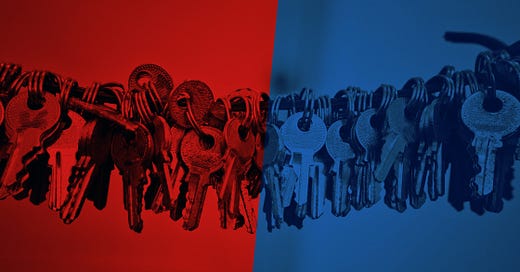I dunno about this Allan Lichtman guy...
What exactly do his "13 Keys to the White House" track? And why?
In the lead up to the 2020 presidential election I made a video documenting a phenomenon I’ve been tracking for about two decades: election-predicting portents with a record of 100% accuracy.
At one time, there were quite a few of these: the outcome of the Washington Redskins’ final home game predicted who would get elected president from 1940 until 2004, when it foretold a Kerry win; the Scholastic corporation did a poll of children that predicted every winner from 1964 up to 2016, when the kids failed to anticipate Donald Trump.
Dr. Allan Lichtman is one of the few high-success portents that remains; he’s a history professor with a pseudo-scientific formula for predicting presidential elections — the 13 “Keys to the White House” (also the title of a book he wrote in 1988) — which has called every winner since 2004. The keys ask a variety of yes-or-no questions about the candidate of the incumbent party and the state of the country (are they already president, is there a foreign policy crisis, etc) and if there are more than six “no’s” the incumbent party loses.
I’ve been willing to give Dr. Lichtman some benefit of the doubt over the years. As a scholar of American history and political commentator, his analysis is often insightful and helpful. In contrast to some, I respect his talent for self-promotion, which has doubtless brought a lot of favourable publicity to the history department of American University. Many of his 13 Keys seemed a bit too subjective (“is the challenger charismatic?”), but I could accept them as a useful shorthand for thinking about the meta-forces that dictate electoral success beyond the political campaign.
A video he posted the other day on his YouTube channel has given me pause, however. What he said in his own defense makes me wonder if the 13 Keys actually sit closer to the football game end of the predictor spectrum.
I said Dr. Litchman has called every presidential winner since 2004, but Litchman prefers to say he’s got only one election wrong since 1984 — he called the 2000 vote for Al Gore. In his recent video, “Setting My Record Straight,” he attempts to justify this error, but in the process just muddies the integrity of his system further.
Al Gore, he says, should have become president in 2000. He was denied the presidency because of skullduggery among Florida vote-counters — a common charge. He also says that he never predicted Donald Trump would win the popular vote in 2016, which some people evidently thought he did.
My system, he says, is “unmistakably talking about who would govern over the next four years not who would have a plurality of the popular vote.” Al Gore should have governed and Trump did, ergo the 13 Keys system is sound.
This is curious, because the 13 keys have an obvious pretence of anticipating democratic reaction to various stimuli: economic growth, significant changes in public policy, social unrest, and others. It seems the system should therefore be able to predict the popular vote winner, since that’s the most visible expression of public reaction expressed through national election. If you ask me, Dr. Litchman should have claimed 2000 a win for his system and 2016 a loss; that might have hurt his credibility in the age of Trump, but brought more long-term coherence to what his keys are measuring.
If the keys just declare “who will govern,” by contrast, then it’s hard to understand why they need bother concerning themselves with data coloring the national mood.
As we know, the US Electoral College can and has elected presidents the majority of Americans don’t want. This seems like it should make key #12 asking whether a candidate is uniquely “charismatic,” for instance, fairly irrelevant. If he is very charismatic, so what? His charms win over a majority of Americans? That advantage can still be cancelled out by an electoral college override, assuming those who don’t find the candidate charismatic are concentrated in enough of the right states. The same can be said of those Americans who are upset at a bad economy, or civil unrest, and everything else the keys track.
Litchman’s 13 variables about the state of America are self-evidently important, but it’s hard to understand how a bunch of nationwide phenomena can be used to predict “who governs” when the governing decision is ultimately made by a bunch of states independently allocating discrete numbers of electoral votes.
Perhaps I am missing the point. Perhaps the 13 Keys just measure correlation, not causation. But if that’s the case, the system is hardly deserving of anymore serious attention than keeping track of which candidate sells more Halloween masks.
EDIT: a reader shares this vastly more comprehensive takedown of Allan Litchman. It’s a remarkable read. It is about a through a debunking and discrediting of anyone as I’ve ever come across. The authors reveal not just that Dr. Litchman’s system is dubious, for reasons including those I discussed above, but also that Litchman himself has been incredibly dishonest over the years about how his system works.






Re: your intro:
https://xkcd.com/1122/
I’ve watched him defend his keys - it seems that his keys were correct after all, it was the voters who were wrong.